
I believe it’s the congressional bylaws that state: When Congress is fighting over money, it’s always the Black initiatives that get the short end of the stick.
Biden ran out here and promised historically Black colleges and universities (HBCUs) some $45 billion in funding and now, with the Biden administration struggling to push its multitrillion-dollar spending plan through—despite having a majority in Congress—that funding has been reduced to some $2 billion.
From Newsweek:
The $3.5 trillion bill was set to include $45 billion for HBCUs and other minority-serving institutions, but the newest iteration of the bill allots only $2 billion for educational programs and infrastructure of HBCUs. That amount could even be reduced to competitive grant funding, instead of direct funding to the schools.
Harry L. Williams, president of the Thurgood Marshall College Fund, which represents public HBCUs, stressed the importance of the funding, and the needs the original funding could have helped fulfill. He said Black colleges have unique history, needs and financial challenges.
They often struggle with funding for upgrading their campuses, updating their research programs, providing essential materials, hiring teachers and attracting new potential students.
And this time, Democrats can’t blame the cut in funding on Republicans as “it be your own people” bickering and infighting that has led to the drastic cut.
Philander Smith College President Roderick L. Smothers told the Associated Press that coronavirus relief money helped the Little Rock, Ark.-based university survive the pandemic, but Biden’s original budget plan would have had a long-term impact.
“We used the funds that we received to serve the students that we have, and now we’re asking for additional funds to make sure that when we are on the other side of this global pandemic our institutions will be bigger and better and more resilient,” Smothers said.
Philander Smith College could’ve used the money to “expand programs for its students, 81 percent of which are low income. That might include launching a public health school that would train students to tackle health disparities affecting racial minorities and help address the state’s nursing shortage,” Newsweek reports.
And now wait to see where the needle drops, but we already know that when it comes to finding money to cut who always gets the short end of the stick.

